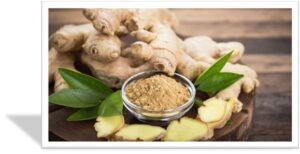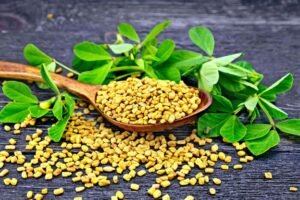Having fewer than three bowel movements for a week is considered constipation. It could be recurring or sporadic. Some of the symptoms are hard stools, straining to have a bowel movement, needing assistance emptying your rectum, abdominal pain, nausea, and bloating.
Fiber-rich herbs are also known as bulk laxatives or bulking agents because the mucilaginous, water-soluble fibers they contain absorbed water and swell, resulting in a slimy, gel-like substance.
Herbal remedies for constipation are relatively easy to come by. Herbal ingredients are found in many over-the-counter laxatives. Anthraquinones, or substances that stimulate the intestines are found in the majority of laxative herbs.
These laxatives work by increasing peristalsis and drawing fluid into the colon.
Peristalsis is a contraction of the intestines that aids in moving material from the colon to the rectum. When constipated, it is critical to consume fiber and fluids.
Continue reading to find out about ten herbal remedies for constipation.
1. Aloe vera latex:

The anthraquinone glycosides found in Aloe vera latex have a well-documented laxative effect. A novel preparation containing Aloe, celandine, and psyllium improves various constipation indicators such as bowel movement frequency, consistency of stools, and laxative dependence.
How to Use it for Constipation:
- Add aloe gel to some water or fruit juice and mix well.
- Take this every morning.
- If you prefer Aloe Vera juice, leave out the juice and water.
- Anytime you feel the need to use a laxative, drink 1 cup of aloe juice.
2. Licorice
Licorice root contains glycyrrhizin, a substance with laxative and anti-inflammatory properties. Its potent antioxidant and antimicrobial properties have made it a popular herbal treatment for ulcers, upper respiratory infections, and skin conditions such as eczema.
Licorice is indigenous to Western Asia, North Africa, and southern Europe. It can thrive to a height of one meter, has flowers that range from purple to pale blue, and has oblong pods with several seeds.
Licorice is a natural way to eliminate waste build-up in the intestine.
Along with its anti-inflammatory properties, licorice root is a popular remedy for digestive issues.
How to Use it for Constipation:
Licorice root tea can help to soothe your digestive system and promote bowel movement. I
Ingredients
- 1 tablespoon of licorice leaves.
- 1 cup water.
Preparation
- Heat the water and licorice leaves in a pot for 10 minutes, then remove from heat, cover, and set aside for 5 minutes.
- Strain and serve.
- You can consume up to 3 cups per day (one on an empty stomach, without food, and the others after meals).
Because too much licorice root can have adverse side effects, limit your intake to half a cup of tea per day.
3. Dandelion

In traditional herbal medicine, People use dandelion root to treat constipation and other digestive symptoms such as bloating and constipation. Dandelion tea can also function as a diuretic, increasing water in the digestive system and stool.
The root contains a high concentration of inulin, a prebiotic fiber that can help with constipation and increase intestinal movement. Dandelion, which is high in antioxidants, can also fight cellular damage in the body.
Dandelion tea relieves mild digestive symptoms such as bloating and constipation.
Furthermore, dandelion can stimulate the liver to produce bile, which can help relieve constipation indirectly.

How to Use it for Constipation:
Ingredient:
- two teaspoons of dried dandelion leaves or the diced root
- a cup of water
Preparation:
- heat a quart of water in a pot
- add two teaspoons of diced root
- Cover the pot, and reduce the heat,
- steep for one minute on the stove before removing it from the burner and steeping for another 20 minutes.
- Add honey or another natural sweetener.
- Serve with a strainer.
4. Ginger

Ginger is often used as a spice and as a natural remedy for ailments such as constipation. If you’ve had a heavy meal, boil one tablespoon of fresh root in two cups of water for at least 10 minutes. The resulting tea can also alleviate nausea and aid in the treatment of colds and flu.
The petals are pale yellow with purple edges on the flowers. It is not to be confused with wild ginger (Asarum canadense). Unlike many herbs, it is cultivated and does not exist in its natural state. However, if your constipation is caused by poor digestion, ginger root tea can help.
How to use it:
- Cut fresh ginger into two half-inch slices.
- Crush or grind the fresh sliced ginger.
- Put a cup of water in the saucepan.
- Bring the water to a boil.
- Add the ginger.
- Reduce the heat for about 3 minutes and turn it off.
- Filter it in a glass.
- You can add other spices to improve the taste, such as cinnamon, cardamom, and black pepper.
5. psyllium husk:

Ayurveda has used psyllium husk as a natural laxative since time immemorial. Because it is insoluble fiber, it is a bulk-forming laxative. The husk helps the stool in your intestine absorb water. Which, in turn, aids bowel movement.
Psyllium is a natural fiber laxative that promotes the formation of large stools. Therefore, chronic constipation is frequently treated with it. For example, taking 1.5 grams of psyllium twice a day for 15 days will increase your stool’s water content and weight.
How to Use It:
- Put 1-2 teaspoons of psyllium husk in a cup of warm milk or water.
- Stir thoroughly and drink this warm, grainy solution.
- Take it right before bedtime.
6 Peppermint
Peppermint oil contains antispasmodic properties that aid in the relaxation of the smooth muscles in your stomach and digestive tract. Peppermint also has analgesic properties that help relieve pain caused by constipation and other digestive disorders, according to the World Health Organization (WHO).
How to Use It:
Peppermint is a popular natural remedy for digestive issues such as constipation.
- Bring two cups of water to a boil.
- Add 15 fresh peppermint leaves (rub them in your hands first to release the oils).
- Steep for 10 to 15 minutes.
- Next, one teaspoon of dried peppermint leaves steeped in a cup of water for about 10 minutes.
- After that, strain the leaves from the liquid and drink.
7. Buckthorn

Buckthorn bark is high in anthraquinone, which stimulates the large intestine’s peristaltic movements. As a result, the bark is purgative and can be used to treat constipation. The bark also increases bile production, which aids digestion and helps cleanse the liver.
How to Make Use of Buckthorn
- Buckthorn bark dried 1 cup water one teaspoon
- For 7 minutes, bring to a boil and then reduce to low heat.
- Drink it before going to bed in the evening because the laxative effect lasts 6-12 hours.
8. Senna

Senna contains a large number of chemicals known as sennosides. These irritate the intestine’s inner lining, resulting in a
laxative effect. As a result, the Senna herb is effective against constipation, and people have used senna for centuries for its laxative properties.
However, long-term, high-dose use has been linked to liver damage.
How to use it:
- Put a cup of water in the saucepan.
- Add one spoon of dry senna leaf
- Please leave it to boil for 30 minutes, and bring it down from the stove
- Filter it in a glass.
- Add honey or another natural sweetener.
- Ready to serve
9. Nettle
Nettle tea’s antioxidant content makes it ideal for dealing with digestive issues and constipation. Carotenoids, fatty acids, vitamins, carbohydrates, and minerals are just a few nutrients and bioactive compounds found in nettle leaves.
A single cup of nettle tea contains between 25 and 30 calories. It has a lot of carbohydrates and protein, but it is low in fat and sugar. In addition, nettle tea’s antioxidant content makes it ideal for dealing with digestive issues, constipation, and general stomach upset.
How to Use it for Constipation:
Ingredients
- 1 cup of water
- One teaspoon fresh nettle
Preparation
- Place the fresh nettle in a cup of boiling water and leave it to cool for a few minutes.
- After that, strain it and serve.
- Drink 2 or 3 times per week; drink it on an empty stomach.
10. Fenugreek

Fenugreek is one of the natural herbs used to treat constipation. Because of its high levels of soluble fiber, it is sometimes recommended as a treatment. Soluble fiber expands or increases in bulk when it absorbs water in the intestines. This expands the stools and promotes bowel movements.
How to Use It
Seeds and leaves of fenugreek are both beneficial natural remedies for constipation.
- You can consume fenugreek as a vegetable
- Add one teaspoon of fenugreek seed powder to a cup of warm water
Special Recipes tip for relieving constipation
- Dandelion root powder two tablespoons
- peppermint one tablespoons
- Psyllium powder two tablespoons
- parts Senna pods, powder one tablespoons
- Ginger root powder one tablespoon
- Licorice root powder one teaspoon
- Place seven tablespoons of herbs in 1 quart of water and simmer,
- Covered for 30 minutes.
- Drink warm as needed for chronic constipation
Where to Buy?
The Takeaway
Nature has the best solutions, and all that is required chiefly is looking for it. The list mentioned above has some herbs and spices to help you cope with Constipation.
Note: Seek advice from your health practitioner before adding these herbs and spices to your diet. Because some herbs and spices might contraindicate with prescription medications.
Disclaimer: The information given here is exclusively for educational purposes only. It should not be construed as a diagnosis, treatment, preventive, or cure for any disease, disorder, or abnormal physical state, nor should it be used in place of medical care from your doctor. Consult an appropriate healthcare professional on any issue concerning your health or well-being before engaging in any health-related activity.
Bulk Supplements

Bulk supplement manufacturing facility is FDA-registered, and they sell more than 400 unique products.
They divide their products into sports and fitness, vitamins/minerals, and herbal supplements.
They sell their products in loose, non-capsule form, and they come in plain-looking bags.
BulkSupplements.com has same-day shipping for almost all orders and also offers international shipping.
Bulk Supplements offers pure dietary supplements ingredients at low prices.


Leave a Reply